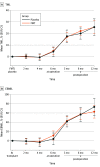Effectiveness of Fecal Microbiota Transplantation for Weight Loss in Patients With Obesity Undergoing Bariatric Surgery: A Randomized Clinical Trial
- PMID: 36525272
- PMCID: PMC9856235
- DOI: 10.1001/jamanetworkopen.2022.47226
Effectiveness of Fecal Microbiota Transplantation for Weight Loss in Patients With Obesity Undergoing Bariatric Surgery: A Randomized Clinical Trial
Abstract
Importance: Severe obesity is a major health concern. However, a few patients remain resistant to bariatric surgery and other treatments. Animal studies suggest that weight may be altered by fecal microbiota transplantation (FMT) from a lean donor.
Objective: To determine whether FMT from a lean donor reduces body weight and further improves the results of bariatric surgery.
Design, setting, and participants: This double-blinded, placebo-controlled, multicenter, randomized clinical trial was conducted in 2018 to 2021 among adult individuals with severe obesity treated at 2 bariatric surgery centers in Finland and included 18 months of follow-up. Patients eligible for bariatric surgery were recruited for the study. Data were analyzed from March 2021 to May 2022.
Interventions: FMT from a lean donor or from the patient (autologous placebo) was administered by gastroscopy into the duodenum. Bariatric surgery was performed 6 months after the baseline intervention using laparoscopic Roux-en-Y gastric bypass (LRYGB) or laparoscopic sleeve gastrectomy (LSG).
Main outcomes and measures: The main outcome was weight reduction measured as the percentage of total weight loss (TWL).
Results: Forty-one patients were recruited to participate in the study and were included in the final analysis (29 women [71.1%]; mean [SD] age, 48.7 [8.7] years; mean [SD] body mass index, 42.5 [6.0]). A total of 21 patients received FMT from a lean donor, and 20 received an autologous placebo. Six months after FMT, 34 patients underwent LRYGB and 4 underwent LSG. Thirty-four patients (82.9%) attended the last visit 18 months after the baseline visit. The percentage of TWL at 6 months was 4.8% (95% CI, 2.7% to 7.0%; P < .001) in the FMT group and 4.6% (95% CI, 1.5% to 7.6%; P = .006) in the placebo group, but no difference was observed between the groups. At 18 months from the baseline (ie, 12 months after surgery), the percentage of TWL was 25.3% (95% CI, 19.5 to 31.1; P < .001) in the FMT group and 25.2% (95% CI, 20.2 to 30.3; P < .001) in the placebo group; however, no difference was observed between the groups.
Conclusions and relevance: FMT did not affect presurgical and postsurgical weight loss. Further studies are needed to elucidate the possible role of FMT in obesity.
Trial registration: ClinicalTrials.gov Identifier: NCT03391817.
Conflict of interest statement
Figures



References
-
- Obesity: preventing and managing the global epidemic. Report of a WHO consultation. World Health Organ Tech Rep Ser. 2000;894:1-253. - PubMed
-
- Syn NL, Cummings DE, Wang LZ, et al. . Association of metabolic-bariatric surgery with long-term survival in adults with and without diabetes: a one-stage meta-analysis of matched cohort and prospective controlled studies with 174 772 participants. Lancet. 2021;397(10287):1830-1841. doi:10.1016/S0140-6736(21)00591-2 - DOI - PubMed
Publication types
MeSH terms
Associated data
LinkOut - more resources
Full Text Sources
Medical
Research Materials

